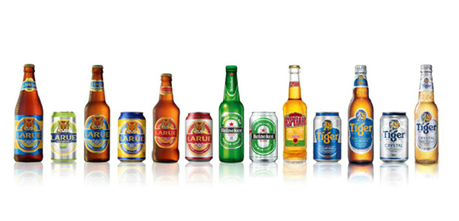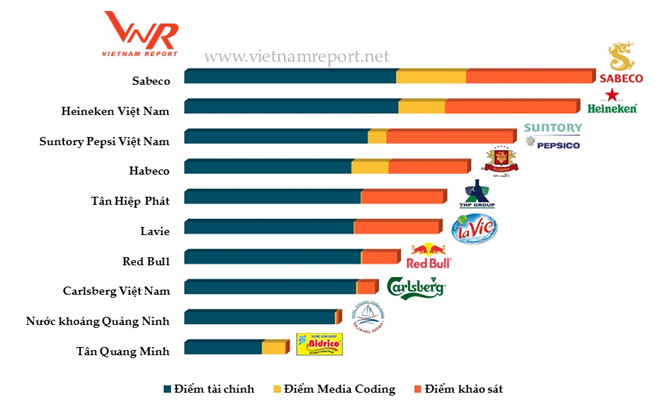Not long after Vietnam's Law on Foreign Investment came into effect in 1987, the food and beverage processing industry emerged as a potential sector with many hundred-million dollar projects. During approximately 30 years of business, many of them have been developing sharply, contributing to Vietnam's socioeconomic development.
Heineken Vietnam Brewery
Heineken Vietnam Brewery Limited Company (Heineken Vietnam Brewery), was established on December 9, 1991 by Saigon Trading Group (SATRA) and Asia Pacific Breweries Ltd. (APBL) with the initial registered capital of $305.4 million. It was renamed Heineken Asia Pacific Pte., Ltd. (Heineken Asia Pacific) in 2013.
Covering an area of 12.7 hectares in District 12, Ho Chi Minh City, the brewery is one of the most modern facilities of its kind in Southeast Asia. For a number of years, Heineken Vietnam Brewery has been one of the top corporate tax payers and was recognised as one of the most effective businesses in Ho Chi Minh City.
Heineken Vietnam Brewery has also created significant employment opportunities, hiring around 1,600 local workers and creating thousands of jobs for suppliers and partners in Vietnam. The company is also active in social activities, human resources development, and leads the way in environmental protection.
Apart from the innovative brewery in District 12, Heineken Vietnam Brewery has wholly-owned breweries in Danang, Quang Nam, and Tien Giang. Currently, it has a broad and impressive portfolio of beers which includes Heineken, Tiger, Tiger Crystal, Desperados, Biere Larue, Biere Larue Export, BGI, and Bivina in Vietnam.
According to Vietnam Industry Research and Consultancy (VIRAC), the revenue of Heineken Trading, the arm in charge of beer distribution in Vietnam, hit VND33.9 trillion ($1.5 billion) in 2016.
Pepsico Vietnam
Pepsico Vietnam was licensed on December 24, 1991 with a registered capital of $180 million, then started to operate as a joint venture in 1994 when the United States lifted the embargo on Vietnam. In 2005, Pepsico was already leading the beverage market.
Notably, in 2004, Pepsico made heavy investments in Vietnam with its first factory in Can Tho and two new factories in Dong Nai and Bac Ninh by 2012. So far, PepsiCo has grown tenfold since 2004 and consistently maintained double-digit growth over the past 12 years. Annual revenue of PepsiCo tripled from $8 billion in 2006 to $22 billion in 2011.
In 2012, PepsiCo and Suntory Holdings Limited (Suntory) formed a strategic alliance in Vietnam. Suntory acquired a 51 per cent stake in PepsiCo’s Vietnamese beverage business, while PepsiCo is a 49 per cent shareholder of Suntory.
The brand also announced to continue pouring $250 million into Vietnam within three years. Ten brands of Suntory Pepsico are working together to reach the retail sales of $1 billion in 2018. Currently, Suntory Pepsico has five factories, 450 distribution points, 3,000 employees, and more than 1.1 million retail outlets.
Regarding the reason for the heavy investments in recent years, Uday Shankar Sinha, CEO of Suntory Pepsico Vietnam, said: "We see a bright future in Vietnam. First of all, the economy grows at an astounding 6-6.5 per cent. Second, there is still ample room for development in the beverage market. Third, the population is astoundingly young, with 55 per cent under 30 years old. Fourth, consumer confidence is still growing."
UmranBeba, president, PepsiCo Asia Pacific said: “Vietnam is a highly attractive growth market where PepsiCo is well positioned in the food and beverage marketplace. We’re focused on expanding our food and beverage business in Vietnam through continued investment across our portfolio, and our beverage alliance with Suntory is an important part of our strategy to position PepsiCo for sustainable long-term growth in the market. Suntory is a world-class company and proven PepsiCo partner, and we believe their expertise and capabilities will drive the continued success of our Vietnam beverage business.”
In 2017, Suntory Pepsico Vietnam is one of the largest companies in the beverage sector, making up 36 per cent of the whole market.
Vedan Vietnam Enterprise Corp., Ltd.
| Two of the above projects rank second and third on Vietnam Report's list of the most reputable companies in the beverage sector |
The largest project at the early time of Vietnam's FDI picture was the $572.7-million Vedan Vietnam Enterprise Corp., Ltd, producing organic fertiliser and feed additives, including starch, glucose syrup, and hydrochloric acid. The project was licensed to Burghley Enterprises Pte., Ltd. (Singapore) on August 3, 1991 and is based in the southern province of Dong Nai.
Vedan (Vietnam) Enterprise Corp., Ltd. operates as a subsidiary of Vedan International (Holdings) Limited. This company has been constantly raising its capital to become the production and supply factory of biotech products for the whole of Asia.
According to Vedan International, its revenue hit $158 million in the first half of 2015 with internal profit of $4.21 million. Vedan Vietnam contributed 52.5 per cent of Vedan International’s total revenue.
Vedan Vietnam has built up a closed system, including a sugarcane starch factory, sweeteners factory, modified starch factory, lysine factory, even a specialised port called Vedan Phuoc Thai berth.
Vedan was the first big brand in the Vietnamese starch market. In addition, Vedan Vietnam’s products are also exported to China, Japan, Taiwan, as well as Southeast Asian and European countries.
Starting from its starch production line, Vedan has extended production to starch products, specialty chemical products, organic fertilisers, and animal feed, among others.
Despite good business performance, the company was involved in a series of environmental scandals in 2008. Specifically, the company poured 105,600 cubic metres of fermented wastewater directly into the Thi Vai River every month.
After the scandal and the emergence of other brands in the sector, Vedan Vietnam is now hard pressed to remain in operation.
VIR